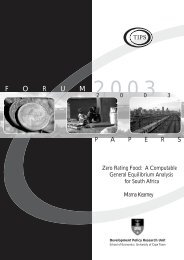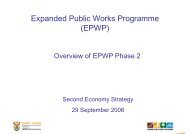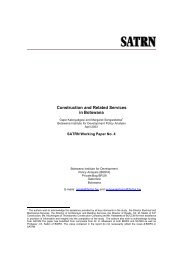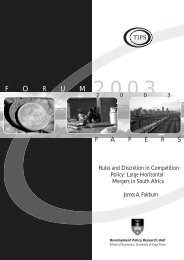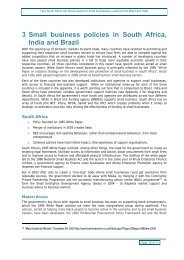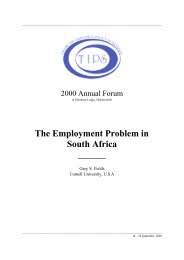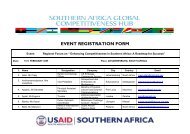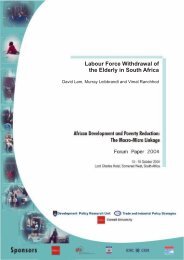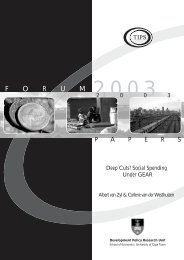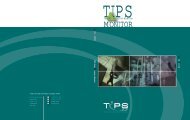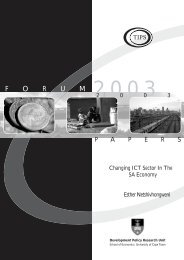(AsgiSA) Annual Report 2008 - South African Government Information
(AsgiSA) Annual Report 2008 - South African Government Information
(AsgiSA) Annual Report 2008 - South African Government Information
You also want an ePaper? Increase the reach of your titles
YUMPU automatically turns print PDFs into web optimized ePapers that Google loves.
Accelerated and Shared Growth Initiative for <strong>South</strong> Africa<br />
ANNUAL REPORT<br />
<strong>2008</strong><br />
4. Skills and education and the role of the Joint Initiative on Priority<br />
Skills Acquisition (Jipsa)<br />
4.1 Background<br />
Against the background of an increasingly volatile global economic environment and the deep-rooted<br />
and systemic nature of the national skills challenge, <strong>South</strong> Africa’s ability to sustain the gains made<br />
with regard to the country’s skills base assumes critical proportions. Indeed, the extent to which Jipsa is<br />
able to ensure that the rapid acquisition of priority skills is pursued consistently over the longer term,<br />
will impact on <strong>South</strong> Africa’s ability to weather a recession and be prepared once a recession has subsided.<br />
Jipsa has been in existence for three years, established by Cabinet in March 2006 to support <strong>AsgiSA</strong>.<br />
Initially, Cabinet approved an 18-month plan for Jipsa. At the end of this period, following a Joint Task<br />
Team Bosberaad in November 2007, Jipsa’s lifespan was extended for another 18 months.<br />
Jipsa continues to enjoy the support and co-operation of government, business, organised labour, professional<br />
bodies and specialist organisations. In its three-year lifespan, it has learnt important lessons<br />
at systemic and project level, and these have informed the input into the proposed National Human-<br />
Resource Development Strategy (HRD-SA).<br />
Jipsa’s role and value lie in bringing the skills challenge to national attention, and in creating a unique<br />
forum for dialogue between the key social actors and role-players and facilitating their practical engagement<br />
with the skills priorities. Its success is reliant on the importance of leadership and ownership<br />
of the skills challenge by the different role-players.<br />
The Jipsa strategy involves broadening the training pipeline, retaining people in skilled employment<br />
and training them more effectively and to higher standards. It is equally important to address the<br />
system blockages and inefficiencies and problems of quality that impede the acquisition of relevant,<br />
high-quality skills to sustain growth over the medium to longer terms.<br />
Five high-profile priority skills areas were identified for immediate attention:<br />
a. high-level, world-class engineering and planning skills for the ”network industries” – transport, communications,<br />
water, energy<br />
b. city, urban and regional planning and engineering skills<br />
c. artisanal and technical skills, with priority attention to infrastructure development, housing and energy,<br />
and in other areas identified as being in strong demand in the labour market<br />
d. management and planning skills in education and health<br />
e. Mathematics, Science and Language Competence in public schooling.<br />
In addition, key ”project owners” and role-players were engaged regarding the skills required to underpin<br />
<strong>AsgiSA</strong> projects and increase labour absorption. This led to concrete proposals for priority skills<br />
initiatives in the fields of tourism, information and communications technology (ICT), business process<br />
outsourcing (BPO) and biofuels. It must be noted, however, that stakeholders have subsequently<br />
agreed that Jipsa should focus attention on the agricultural sector in general and not limit itself to the<br />
biofuels sector narrowly.<br />
25



